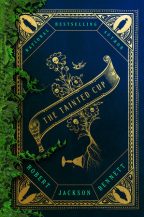 Kirkus: A supernatural mystery unfolds aboard a boat with a haunted history.
Kirkus: A supernatural mystery unfolds aboard a boat with a haunted history.
Chrissy, Chase, Kiki, and Emma, all 18, are recent high school graduates known as the Ghost Gang. Their YouTube channel has over a million subscribers, and after their last ordeal, in which a deranged serial killer fan terrorized them while they were filming an episode at the Hearst Hotel, the pressure’s now on them to deliver another heart-pounding show. The Ghost Gang also hopes to leverage their fame into a TV deal. With that goal in mind, they board the famously haunted cruise ship the RMS Queen Anne, sister ship of the Titanic, which will be sailing from New York City to Southampton for its inaugural voyage after major refurbishment. On board, they meet the Paranormal Patrol, a rival ghost-chasing crew. Told in alternating first-person viewpoints, this creepy and atmospheric story follows the main foursome as they have a series of chilling ghostly experiences while trying to unlock the truth of the ship’s past. Each Ghost Gang member faces a different challenge, putting their skills, confidence, and sometimes their safety to the test. Kiki is brown-skinned; the other major characters read white, and Kiki and Emma are queer. This follow-up to Horror Hotel (2022) will please returning fans, and the adventure holds water as a stand-alone adventure.
A fast-paced and fun Scooby-Doo–esque paranormal page-turner. (Horror. 13-18)
 New York Times: The Saint of Bright Doors by Vajra Chandrasekera is the best book I’ve read all year. Protean, singular, original, it forces me to come up with the most baffling comparisons, like: What if “Disco Elysium” were written by Sofia Samatar? At the same time, all you need to know about it is contained in its opening:
New York Times: The Saint of Bright Doors by Vajra Chandrasekera is the best book I’ve read all year. Protean, singular, original, it forces me to come up with the most baffling comparisons, like: What if “Disco Elysium” were written by Sofia Samatar? At the same time, all you need to know about it is contained in its opening: New York Times: The Saint of Bright Doors by Vajra Chandrasekera is the best book I’ve read all year. Protean, singular, original, it forces me to come up with the most baffling comparisons, like: What if “Disco Elysium” were written by Sofia Samatar? At the same time, all you need to know about it is contained in its opening:
New York Times: The Saint of Bright Doors by Vajra Chandrasekera is the best book I’ve read all year. Protean, singular, original, it forces me to come up with the most baffling comparisons, like: What if “Disco Elysium” were written by Sofia Samatar? At the same time, all you need to know about it is contained in its opening: Kirkus:
Kirkus: Publishers Weekly:
Publishers Weekly: Kirkus:
Kirkus: Library Journal:
Library Journal:
 Booklist:
Booklist:  Publishers Weekly:
Publishers Weekly: